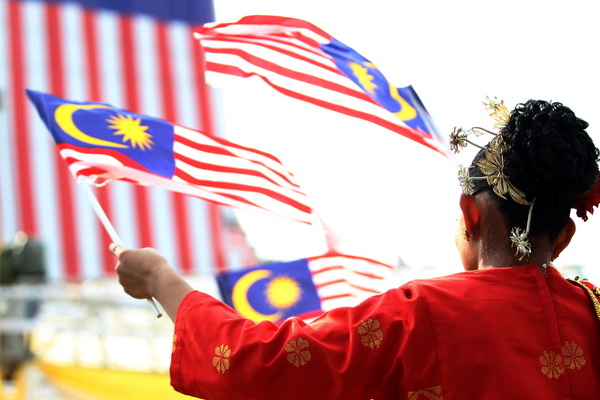

In May this year, the incumbent Prime Minister Najib Razak led Barisan Nasional (BN) coalition, which has governed Malaysia since 1957, was re-elected for the thirteenth time in a row. The record 85 percent voter turnout gave BN 133 out of 222 parliamentary seats, with the remaining going to Anwar Ibrahim led Pakatan Rakyat (PR), a three-party opposition coalition. But more importantly, BN secured only 47 percent of the popular vote, which is its worst-ever electoral performance. Analysts have thus argued that if another election victory is an endorsement of government’s strong performance under the Economic Transformation Programme, BN’s shrinking voter base is a timely reminder for PM Najib to pay heed to PR’s election rallying-cry of “ubah” or “change” in BN’s policies of Malay racism.
After Singapore separated from Malaysia, the then Singapore’s Prime Minister Lee Kuan Yew made Singapore a multiracial meritocracy where “everybody will have his place: equal; language, culture, religion”, as noted by him during the pledge he took on August 9, 1965. Contrary, Malaysia embarked on affirmative-action policies favouring the ethnic-Malay majority [Bumiputeras as coined by Tunku Abdul Rahman meaning “sons of the soil”] over a quarter population of Chinese Malaysians and about 8 percent Indian Malaysians.
These policies, while generating a strong rural support base for The United Malays National Organisation (UMNO) that dominates BN, alienated the Chinese and other voters. These are also deemed to be the root cause of corruption and cronyism plaguing the Malaysian society right now. Even though in his year-long election campaign, Najib tried to woo the younger and liberal urban voters by beginning to dismantle some of the Bumiputeras policies, UMNO, led by former PM Mahathir Mohamad, was still as racially divisive as ever in the Malay rural heartlands. Najib too spoke of a “Chinese tsunami” that had hit BN after the elections, and stressed on the need for a period of “national reconciliation” in Malaysia.
Though not entirely true, Najib assertions are not without substance. The Chinese-based parties in the BN, namely Malaysian Chinese Association, Gerakan and Sarawak United People’s Party won only nine seats while the opposition ethnic-Chinese Democratic Action Party swept 38 of the 51 seats it contested. Also, the Malaysian Indian Congress (MIC) – a component of the ruling BN, won just four out of the nine seats it contested. Twice as much Indian candidates won from the opposition PR.
What is noteworthy is that BN lost seats in predominantly Malay seats even in the urban areas, indicating an urban-rural divide to go along with the predominant racial element in the elections. So much so that Mahathir who expressed shocked at BN’s performance in the elections blamed it on “greedy” Malays and “ungrateful” Chinese. The local media has not helped either. The UMNO-aligned newspaper, Utusan Malaysia, published an article posing the question Apa lagi Cina mahu [“What else do the Chinese want”] just after the elections.
Contrast this to Singapore, where Malays enjoy constitutional protection as a minority and authorities have time and again expressed commitment to treat them with “extra care”.
Article 152 of Singapore’s constitution states,“ Minorities and Special Position of Malays: It shall be the responsibility of the government constantly to care for the interests of the racial and religious minorities in Singapore. The government shall exercise its functions in such manner as to recognise the special position of the Malays who are the indigenous people of Singapore and, accordingly, it should be the responsibility of the government to protect, safeguard, support, foster, promote their political, educational, religious, economic, social and cultural interests and the Malay language.”
The constitutional guarantee and Singapore’s ingrained multiracial approach is good, “but there is clearly much that can be improved”, as noted by The Strait Times Managing Editor Han Fook Kwang in his commentary, Race politics all over again, published after the Malaysian elections in his newspaper. Few measures that Han proposes include proper representation of Malays in key institutions in Singapore, and strict action against those who discriminate against minorities in jobs and homes to rent.
Lee Kuan Yew too while speaking in parliament in 2009 said,” Our constitution spells out the duty of the government to treat Malays and other minorities with extra care.” While referring to the pledge he took in 1965, Lee added that it’s an aspiration which Singapore must keep trying to achieve. Prime Minister Lee Hsien Loong also alluded to the issue last year in his address at the Association of Muslim Professionals (AMP) third convention. “The Malay-Muslim community (MMC) has done well in Singapore’s merit-based system and without affirmative action.”
The MMC itself has identified various areas where it needs improvement.
The AMP, in its convention journal, The Next Decade: Strengthening Our Community’s Architecture, highlighted some worrying trends in the community. These include demographic challenges [decrease in percentage of population], competition with other communities and immigrants for scholarships and jobs, cheaper foreign labour presenting competition to the Malay lower-waged worker, widening income gap between the MMC and other communities, Malay students’ performance in the key examinations being below the national benchmarks, increasing number of divorce cases among both youth and middle-aged couples, increase in actual number of drug abusers, crime and delinquency among Malay youths, and community’s disproportionate representation in major chronic diseases.
http://newzzit.com/stories/its-time-bumiputeras-learn-something-from-lees-one-singapore

